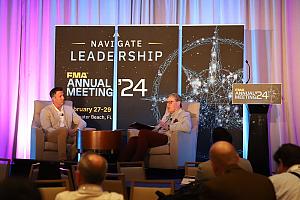Marketing Communications Specialist
- FMA
- The Fabricator
- FABTECH
- Canadian Metalworking
Safety starts with Hydrostatic testing
New program provides training opportunities in Canada for the first time
- By Rhea Gill
- UPDATED March 11, 2020
- March 11, 2020
Canada’s first hydrostatic testing training program was launched in January of this year and is a must-have for all personnel involved in the planning, execution, and inspection of hydrostatic testing. It ensures that everyone involved in any given hydro test will have the same baseline training and safety protocols across Canada.
Hydrostatic Testing Basics
Hydrostatic testing is a process used to inspect equipment such as chemical pipelines through a hydrostatic tester.
In preparation for the testing, test heads and endcaps are installed on each end of the pipeline to be tested. Generally, water tanks are brought on-site and connected to the test heads via water pumps. The test heads contain a foam plug, which, when water is injected into the pipeline through the water pumps, acts as a piston to expel any air out of the pipeline, leaving the pipeline full of water.
The water pressure during this process is increased beyond normal operating levels to confirm the integrity of the pipeline. If any inconsistencies are detected, the pipeline is uncovered and replaced or repaired and then retested. The pipelines are examined for leaks, and the overall reliability of each unit is assessed.
Hydrostatic testing is a highly accurate way of testing pipelines and prevents the rupturing of outdated equipment. It also can avoid potential safety penalties for organizations, making it a necessity in protecting the safety of Canadians by ensuring that the work done on critical building and infrastructure projects conforms to Canadian codes and standards.
A Canadian Program
Previously, programs of this nature required students to travel to Houston, Texas, for a two-day program. With the introduction of this new program, Canadian companies and employees have the opportunity to learn and train locally. The program provides a comprehensive review of hydrostatic theory augmented with in-class applied practical exercises and demonstrations. The most exciting part of the program is that all trainees learn standard practices that will make their skills transferrable across Canada.
The program has been developed in partnership with ATCO Gas and Pipelines Ltd., which not only offers expertise in the area, but will partner with the CWB Group in the development of the practical materials required to test attendees in a real-world atmosphere.
“As a front-line supervisor, I’m asked to assess and establish worker competence to ensure pressure testing is done safely and correctly,” said Scott Blackburn, welding quality supervisor at ATCO Gas and Pipelines Ltd. “CSA Z662 requires that pressure tests are conducted under the direction of qualified personnel with the ability to perform the required duties. The Hydrostatic Testing Certification is important to close that loop, specifically from a qualification and training perspective. The training not only equips me with the knowledge, tools, and expertise to make the right decisions when evaluating my team’s competence, but also establishes a safe pressure test environment across the industry.
“Further, Alberta Occupational Health and Safety grants rights: the right to know about workplace hazards and have access to basic health & safety information, the right to participate in health & safety discussions and committees, and the right to refuse dangerous work and know that you’re protected from reprisal,” continued Blackburn. “Having the knowledge that the Hydrostatic Testing Certification contributes to the development of competent personnel from design to execution of testing, in line with OHS rights.”
Hosting the program in Canada has many benefits, including standardized training based on the stringent Canadian standards that we pride ourselves upon and eliminating costly travel to the U.S. for our workers. To learn more about hydrostatic testing training, please visit www.cwbgroup.org/htc.
Rhea Gill, rhea.gill@cwbgroup.org, is marketing communications specialist at the CWB Group, www.cwbgroup.org.
subscribe now


Keep up to date with the latest news, events, and technology for all things metal from our pair of monthly magazines written specifically for Canadian manufacturers!
Start Your Free SubscriptionAbout the Author
- Industry Events
MME Saskatoon
- May 28, 2024
- Saskatoon, SK Canada
CME's Health & Safety Symposium for Manufacturers
- May 29, 2024
- Mississauga, ON Canada
DiPaolo Machine Tools Open House 2024
- June 4 - 5, 2024
- Mississauga, ON Canada
FABTECH Canada
- June 11 - 13, 2024
- Toronto, ON Canada
Zoller Open House & Technology Days 2024
- June 12 - 13, 2024
- Ann Arbor, MI






















